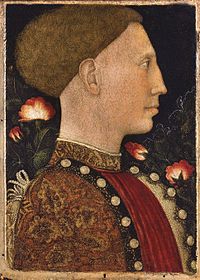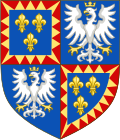Λεονέλλο των Έστε
Ο Λεονέλλο, ιταλ. Leonello, (21 Σεπτεμβρίου 1407 – 1 Οκτωβρίου 1450) από τον Οίκο των Έστε ήταν μαρκήσιος της Φερράρα και δούκας της Μόντενα και του Ρέτζο (1441-1450).
| Λεονέλλο των Έστε | |
|---|---|
 | |
| Γενικές πληροφορίες | |
| Γέννηση | 21 Σεπτεμβρίου 1407 ή 1407 Φερράρα |
| Θάνατος | 1 Οκτωβρίου 1450[1] ή 1450 Βογκιέρα |
| Τόπος ταφής | Φερράρα |
| Πληροφορίες ασχολίας | |
| Ιδιότητα | ηγεμόνας μαικήνας καθηγητής |
| Οικογένεια | |
| Σύζυγος | Margherita Gonzaga Maria of Aragon |
| Τέκνα | Niccolò d'Este |
| Γονείς | Νικολό Γ΄ ντ'Έστε και Stella de' Tolomei |
| Αδέλφια | Τζινέβρα των Έστε Έρκολε Α΄ ντ'Έστε Ούγκο των Έστε Σιγισμούνδος των Έστε (1433-1507) Μελιαντούζε των Έστε Μπόρσο των Έστε |
| Οικογένεια | Οίκος των Έστε |
| Αξιώματα και βραβεύσεις | |
| Αξίωμα | Duke of Ferrara and of Modena |
| Θυρεός | |
 | |
Βιογραφία
ΕπεξεργασίαΟ Λεονέλλο ήταν ένας από τους νόθους γιους του Νικολό Γ΄ μαρκήσιου της Φερράρα και της Μόντενα και της ερωμένης του Στέλλα ντε' Τολομέι. Αμφιθαλείς αδελφοί του ήταν ο μεγαλύτερος Ούγκο και ο μικρότερος Μπόρσο.
Ο πατέρας του είχε άλλους τρεις νόθους γιους από άλλες ερωμένες και τον Αλφόνσο Α΄ από την τρίτη σύζυγό του. O Ούγκο, που ήταν 26 έτη μεγαλύτερος του Αλφόνσου Α΄, ορίστηκε διάδοχος, αλλά κατηγορήθηκε για μοιχεία και αποκεφαλίστηκε. Έτσι ο Λεονέλλο που είχε υψηλή μόρφωση, αρετές, την αναγνώριση του πάπα και ήταν δημοφιλής, έγινε διάδοχος[2].
Είχε μικρή επιρροή στα πολιτικά πράγματα της Ιταλίας. Σε αντίθεση με τους προηγούμενους των Έστε, τον Νικολό Γ΄ ή τον Άτσο Ζ΄, που με τη δύναμή τους έλεγχαν το πολιτικό γίγνεσθαι, ο Λεονέλλο έγινε γνωστός ως προστάτης των Τεχνών. Η Φερράρα αναπτύχθηκε πολιτιστικά[3]. Με την καθοδήγησε του διδασκάλου του, του ανθρωπιστή Γκουαρίνο Βερονέζε, αναμόρφωσε το Πανεπιστήμιο της Φερράρα[4]. Επηρέασε τους μετέπειτα ηγεμόνες της πόλης και είναι ο πρόδρομος των μετέπειτα επιτευγμάτων.
Απεβίωσε το 1450 άτεκνος και τον διαδέχθηκε ο επόμενος αδελφός του Μπόρσο.
Οικογένεια
ΕπεξεργασίαΤο 1435 νυμφεύτηκε τη Μαργαρίτα Γκοντζάγκα, κόρη του Ιωάννη-Φραγκίσκου μαρκήσιου της Μάντοβα. Το 1439 η Μαργαρίτα απεβίωσε χωρίς να αποκτήσουν απογόνους.
Το 1444 ο Λεονέλλο νυμφεύτηκε, για δεύτερη φορά, τη Μαρία της Ιβρέας-Τρασταμάρα, νόθη κόρη του Αλφόνσου Ε΄ της Αραγωνίας και Α΄ της Νάπολης· δεν απέκτησαν απογόνους.
Αναφορές
Επεξεργασία- ↑ (Αγγλικά) SNAC. w6p86j14. Ανακτήθηκε στις 9 Οκτωβρίου 2017.
- ↑ Bestor, Jane Fair. Bastardy and Legitimacy in the Formation of a Regional State in Italy: The Estense Succession. Comparative Studies in Society and History, 1996, p. 571-2
- ↑ Martin Gosman, Alasdair James Macdonald and Arie Johan Vanderjagt.Princes and Princely Culture: 1450-1660, 2005, p.32
- ↑ Paful F. Grendler. The Universities of the Italian Renaissance, 2002.
Πηγές
Επεξεργασία- Banker, James R. Piero della Francesca: Artist and Man, United Kingdom: Oxford University Press, 2014.
- Baxandall, Michael. "A Dialogue on Art from the Court of Leonello d'Este: Angelo Decembrio's De Politia Litteraria Pars LXVIII." Journal of the Warburg and Courtauld Institutes 26, no. 3 - 4 (1963): 304 - 326.
- Bayer, Andrea (2008). Art and Love in Renaissance Italy. Metropolitan Museum of Art.
- Bestor, Jane Fair (1996). «Bastardy and Legitimacy in the Formation of a Regional State in Italy: The Estense Succession». Comparative Studies in Society and History 38 (3): 549–585. doi:. https://archive.org/details/sim_comparative-studies-in-society-and-history_1996-07_38_3/page/549.
- Blaisdell, Charmarie Jenkins. 1975. Politics and heresy in ferrara, 1534-1559. The Sixteenth Century Journal 6, (1): 67-93.
- Carroll, Linda L. "'Fools of the Dukes of Ferrara': Dosso, Ruzante, and Changing Este Alliances." MLN 118, no. 1 (2003): 60-84.
- Cavallo, Jo Ann (2004). The Romance Epics of Boiardo, Ariosto, and Tasso: From Public Duty to Private Pleasure. University of Toronto Press.
- da Oriolo, Giovanni. Leonello d’Esta (Portrait) 1447, The National Gallery. Trafalgar Square, London WC2N 5DN, United Kingdom. Visited: 23 March 2015. http://www.nationalgallery.org.uk/
- Dean, Trevor (2002). Land and Power in Late Medieval Ferrara: The Rule of the Este, 1350-1450. Cambridge University Press.
- Ferrara, City of the Renaissance, and Its Po Delta. UNESCO World Heritage Centre. Retrieved from http://whc.unesco.org/en/list/733 on 26 March 2015.
- Fry, Roger (1911). «A Portrait of Leonello d'Este by Roger van der Weyden». The Burlington Magazine for Connoisseurs 18 (94): 200–202.
- Grendler, Paul F. The Universities of the Italian Renaissance, Baltimore: The Johns Hopkins University Press, 2002.
- Hourihane, Colum (2012). The Grove Encyclopedia of Medieval Art Architecture. Oxford University Press.
- James, Carolyn. "Machiavelli in Skirts." Isabella d'Este and Politics. Netherlands: Springer, 2007.
- Kantorowicz, Ernst. "The Este Portrait by Roger van der Weyden." Journal of the Warburg and Courtauld Institutes 3, no. 3 - 4 (1940): 165 - 180.
- Lockwood, Lewis. Leonello’s rule, 1441–50; the court chapel. England: Oxford University Press, 2009.
- Lockwood, Lewis (2009). Renaissance Ferrara 1400-1505: The Creation of a Musical Center in the Fifteenth Century. Oxford University Press.
- Pisanello, Antonio di Puccio. Cast bronze medal of Leonello d’Este Marchese of Ferrara (Medal) 1441, The British Museum. Great Russell Street London WC1B 3DG, United Kingdom. Visited: 9 February 2015. http://www.britishmuseum.org/
- Pisanello, Antonio di Puccio. Leonello d’Este (Medal) 1444, Victoria and Albert Museum. Cromwell Road, London SW7 2RL, United Kingdom. Visited: 7 February 2015. http://www.vam.ac.uk/.
- Pisanello, Antonio di Puccio. Bust of Leonello, Marquess of Este (Medal) 1450, Victoria and Albert Museum. Cromwell Road, London SW7 2RL, United Kingdom. Visited: 7 February 2015. http://www.vam.ac.uk/.
- Shephard, Tim. Echoing Helicon: Music, Art and Identity in the Este Studioli, 1440-1530, United Kingdom: Oxford University Press, 2014.
- Tavernor, Robert. On Alberti and the Art of Building, Yale University Press, 1999.
- Tuohy, Thomas. Herculean Ferrara: Ercole D'Este (1471-1505) and the Invention of a Ducal Capital. England: Cambridge University Press, 2002.
Εξωτερικοί σύνδεσμοι
Επεξεργασία- Extended biography
- The Gubbio Studiolo and its conservation, volumes 1 & 2, from The Metropolitan Museum of Art Libraries (fully available online as PDF), which contains material on Leonello d'Este (see index)